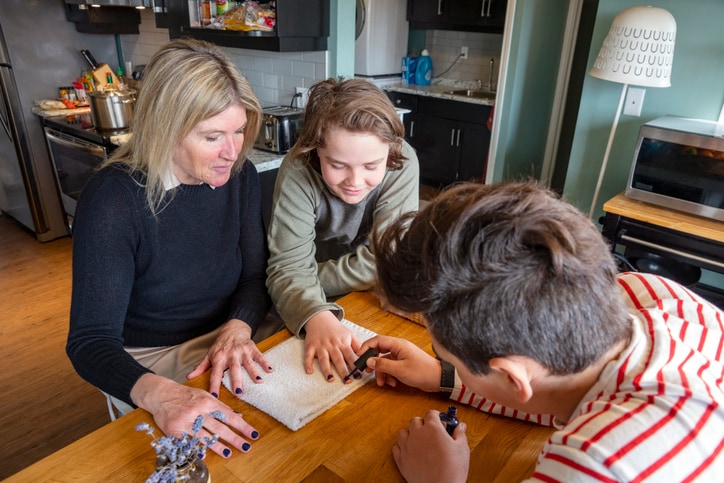Caitlin Fitzgordon, a mom of two in Brooklyn, New York, knew something needed to change when she found her temper toward the kids going from 0 to 60 in mere seconds. “If the kids didn’t put their shoes exactly when I asked them to, I would just start screaming,” she remembers. As you can imagine, it was a cycle that repeated itself, a lot. Worse, it triggered a host of other unpleasant emotions for Fitzgordon, including guilt, shame and feeling out of control. “I’d scream, then weep out of horror at myself.”
Despite a sincere desire to change, Fitzgordon felt trapped. It’s not surprising, says Hal Runkel, licensed marriage and family therapist, author of “Screamfree Parenting” and founder of the Screamfree Institute. “We scream when we think we’re responsible for getting our kids to behave. But our job is to help them manage themselves. It’s very difficult to get out of the screaming habit if you don’t change your overall approach toward parenting.”
Whether you are a parent, a nanny or a babysitter, here are seven ways to stop feeling stuck in scream mode and stay calm with kids.
1. Make staying calm your No. 1 priority
No matter how much you’d like to get out the door or put the kids to bed “on time,” if you have to scream to make it happen, you’re doing yourself a disservice. “If you want your kids to behave, you have to manage your own behavior,” Runkel says. Place all your attention on staying calm — instead of on getting your kids to do what you want. “Freaking out only creates the very outcomes you were trying to avoid.”
2. Put yourself first
“Organizing your whole life around your kids is a recipe for disaster,” Runkel says — one that only leads to you resenting them and having little patience. Schedule your workout or date with a girlfriend (or both) first, then decide what outings you’ll do with the kids that week.
3. Banish “OK?”
Rather than trying to get your kids to approve every decision — “We’re going in five minutes, OK?” — simply state the facts. If the kids protest, stand firm: “I know you’re upset but we’ve had fun, it’s time to go.” You may think you’re making your life easier by clearing things with them, but you’re only making things worse. “Kids look to you for leadership,” Runkel says. “If you’re constantly asking for their approval, you make yourself look weak, which makes them scared.”
4. Nurture your relationships
It’s vital that you don’t look to your kids to complete you, says Runkel. “Tend to your adult relationships, particularly your marriage, so you can approach your kids from a position of fullness, instead of needing them to fill you up.” Go on date night or out with girlfriends and don’t talk about kids. Talk about your dreams, your life and what you want to accomplish, so kids don’t become your primary mission in life.
5. Retreat from the kids
You have to take quality time, Runkel counsels. “Taking intentional retreats from the kids gives you a chance to regroup and come back stronger.” If your kids are old enough, arrange for them to have a sleepover. If they’re very young, hire a babysitter or create a co-op with another local mom so you can have two hours to yourself. “You can take the kids with you and hate them for two hours, or have that time to yourself and be happy to see them at the end,” Runkel says.
6. Have an in-the-moment strategy
Of course, meltdowns (yours and theirs) will still happen. When you need to calm down in the moment, try breathing, counsels Meagan Francis, blogger and author of “The Happiest Mom.” “It’s impossible to yell at your kids if you’re inhaling,” she says. Breathe in to a count of 10 before you even open your mouth. And when you do start speaking to your kids, use a quiet voice. “I’ve noticed that the softer I speak, the more my kids pay attention,” Francis says. “You also avoid being ‘that mom’ who’s losing it on aisle four.”
7. Admit when you mess up
Should you still go overboard in your reaction, an apology can go a long way toward getting you all back on track again. “Saying ‘I’m sorry’ when I overreact teaches my kids that apologizing when you’re wrong is the right thing to do,” Francis says, “and it makes everyone feel a whole lot better.”
For Fitzgordon, an a-ha moment finally helped her get off the scream-cry-scream carousel. “I realized the times when I’m at my wits’ end with my kids are when I have no juice in my batteries — I haven’t exercised, haven’t been getting enough sleep, haven’t been eating well.” Instead of convincing herself they didn’t have money for her to go to a yoga class, for example, she simply went. Instead of rushing to get things done while the kids were in school and skipping lunch — only to be famished at pickup — she began taking 20 minutes to sit down and eat a midday meal. And instead of immediately saying no to all invitations from friends, she started asking herself, “How could I make this work?”
“When I take the time to do the things that ground me and remind me who I am beyond motherhood, everything is better. I’m more loving toward my husband. I appreciate my kids without wanting them to be different.” Perhaps most importantly, she’s happier with herself. “Instead of feeling like I’m a bad mother, I think, ‘I’m pretty great.'”






